India election 2024
Modi Declares Victory in India Election but Party Faces Shock Losses and Will Need Coalition
The party's reduced majority and the resurgence of the opposition signal a new era of coalition politics in India
Indian Prime Minister Narendra Modi has declared victory in the 2024 general elections, securing a historic third term in office. However, the celebrations at the Bharatiya Janata Party (BJP) headquarters were notably subdued as the party faced significant setbacks, falling short of an outright majority in the Lok Sabha, India's lower house of parliament.
The BJP, which had confidently projected a landslide victory with over 400 seats, managed to secure approximately 240 seats, a sharp decline from the 303 seats it held in the 2019 elections. This outcome necessitates the formation of a coalition government, marking the first time Modi will have to rely on external support since he began his political career over two decades ago.
Despite the setback, Modi addressed a gathering of supporters in New Delhi, expressing gratitude for the continued faith placed in the National Democratic Alliance (NDA). "People have reposed faith in the NDA for a third consecutive term! This is a remarkable achievement in India's political history," Modi proclaimed, emphasizing the democratic mandate received by his coalition.
The election results have reshaped India's political landscape, with the opposition INDIA alliance, led by the Congress party, making unexpected gains. The alliance, which includes 24 parties, secured over 200 seats, significantly narrowing the gap with the BJP. This resurgence of the opposition has been attributed to their focus on economic issues such as high inflation and unemployment, which resonated with voters across the country.
The BJP's campaign strategy, which heavily relied on Modi's personal charisma and a polarizing Hindu nationalist agenda, faced criticism for failing to address pressing economic concerns. During the campaign, Modi's rhetoric increasingly targeted the Muslim minority, a move aimed at consolidating the Hindu vote but which may have alienated other segments of the electorate. The opposition, on the other hand, framed the election as a battle to preserve India's secular constitution and democratic institutions.
In key states like Uttar Pradesh and Maharashtra, the BJP suffered notable defeats. In Uttar Pradesh, the party lost the Faizabad parliamentary district, home to the controversial Ram Temple, a significant symbol in the BJP's Hindu nationalist campaign. The party also faced losses in Maharashtra, Haryana, Rajasthan, and Punjab, states that have been epicenters of India's agrarian crisis and major farm protests.
Political analysts suggest that the election results signal a return to coalition politics in India, a departure from the one-party dominance model that the BJP had enjoyed over the past decade. Sandeep Shastri, a political scientist, noted, "India will likely have an NDA government, where the BJP does not have a majority on their own, and coalition politics will come into real play."
The financial markets reacted negatively to the election results, with the Indian stock market plunging to a four-year low. Investors expressed concerns over the potential difficulties the BJP might face in passing legislation without a clear majority. The Nifty 50 and the BSE Sensex both experienced significant declines, reflecting the market's apprehension about the political uncertainty.
Modi's third term will be marked by the need to address the economic challenges that dominated the election discourse. Unemployment remains a major concern, with the unemployment rate rising to 8.1% in April. The BJP's economic policies, which have focused on infrastructure development and welfare programs, will need to be recalibrated to meet the demands of a diverse and increasingly discontented electorate.
The election results have also raised questions about the future of India's democratic institutions. Critics have accused the BJP of undermining these institutions for partisan gains, a charge the party has consistently denied. The changed composition of the parliament is expected to lead to more robust debates and discussions, potentially curbing the BJP's ability to push through legislation unilaterally.
As Modi prepares to form a coalition government, the political dynamics in India are set to undergo significant changes. The need for alliances with smaller regional parties will require a more collaborative approach to governance, a departure from the centralized power structure that has characterized Modi's previous terms. This shift could lead to a more inclusive and representative government, reflecting the diverse aspirations of India's vast population.
In conclusion, while Modi's victory marks a historic third term, the election results underscore the challenges ahead for the BJP. The party's reduced majority and the resurgence of the opposition signal a new era of coalition politics in India, with significant implications for the country's democratic and economic future.

